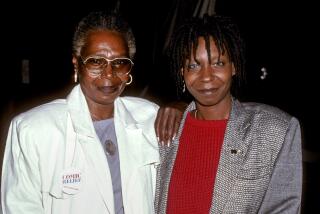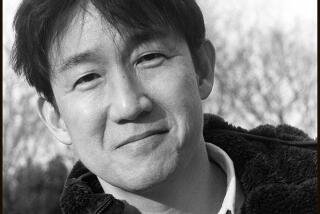A Poet’s Labor of Love: Translating Yiddish Works for the World to See
. . . complete the story!
We are the last listeners.
So few Jews survived--
If it gets too late,
who will be your listeners?
Yiddish poet Itzik Manger’s “To Bratslaver’s Seventh Beggar”
Murray Wolfe works late at night in the book-lined study of his Panorama City town house. He labors over draft after draft as he perfects his translations of Yiddish poetry. He wants to let the English-speaking world read these poems.
“You get into the poet’s head and you have to think what he thought,” Wolfe said. “You have to live what he’s writing. Then you can re-create it.
“I want the world to see.”
Yiddish is taught at many colleges, including UCLA and Valley College. But Wolfe believes that book learning is not enough. He thinks that the translator of poetry must be a poet himself and a native speaker of the language.
“You have to have the feeling of it,” said Wolfe, whose first language was Yiddish. “You have to be brought up with it. You have to know the sounds. You have to know the idioms.”
English Equivalents
Still, translating Yiddish is no easy task. Wolfe, a retired jeweler, must struggle to find the equivalents to Yiddish words that may have several or no direct translations into English.
His translations, as well as some of his own poetry, have appeared in such prestigious literary journals as Poetry LA, the University of California’s California Quarterly and Translation. He has also read translations on KPFK-FM (90.7) and regularly performs translations and his own work at public readings throughout Southern California.
“ Beshert is my favorite Yiddish word,” Wolfe said. “Beshert literally means ‘meant to be.’ I have been a poet for all of eight years. And I wish I were a poet for 50.
“But it was beshert that I discovered poetry in my later life,” he said. “Because if I had discovered it earlier I would not have had the maturity to handle it.”
Nothing in Wolfe’s background would suggest such a mission this late in his life. Born in Czechoslovakia, Wolfe emigrated as a young boy with his family to New York City in 1939. He quickly began a life of industry, selling shirts door-to-door after school.
Economics Education
He then entered the jewelry business and, at about the same time, studied economics at Brooklyn College.
“I started out as a diamond cutter when I was 14 years old,” Wolfe said. “The jewelry business was where I made my living. I worked every day of my life, except for two years of ‘holiday’ during the Korean War.”
This hectic pace was beshert for that period of his life, just as his literary and spiritual life is beshert now. For it was in recent years, during the last few years of a bad marriage, that Wolfe began writing poetry as therapy.
“I used to get up at two o’clock in the morning and sit down and just write,” he recalled. “It came out in a form that had rhythm to it. And after a while I realized this sounded like poetry.”
Wolfe then enrolled in a writing class taught by Jewish Zen poet Peter Levitt at UCLA Extension. “I found out I wasn’t a poet yet. But I found out what poetry was about,” he said.
No Good Yiddish Poems
After three years of Levitt’s workshops, Wolfe’s poetry began to improve. During class one day, the subject of Yiddish poetry came up. Wolfe categorically stated that there weren’t any good Yiddish poems.
“Peter asked me, ‘How do you know? Have you read Yiddish poetry?’ I said I’d read the translations.”
The instructor assigned Wolfe to write his own translation of a Yiddish poem. Because Yiddish was Wolfe’s first language--followed by Czech and English--he set at the task.
“I brought in that first one, and it was terrible. But he encouraged me,” Wolfe said. “I’ve been doing some translations now for four years solid.”
Wolfe said that, because so many Jews were lost to the Holocaust and because Israel chose biblical Hebrew over Yiddish as its official language, there are few native Yiddish speakers left.
“I took to it because I realized there aren’t very many translators of Yiddish around anymore,” he said.
Horrific Images
Many of the poems Wolfe translates evoke horrific images of the Holocaust. He cites Abraham Sutzkever’s “Frozen Jews”:
Have you seen over snow-covered fields
frozen Jews, row after row?
They lay breathless, marbleized and blue,
their bodies lacking only Death.
Somewhere frozen magic lights the spirit,
like a golden fish, in an iced wave.
They don’t speak. Aren’t still. Each is entombed.
The sun too lies frozen in the snow at night.
In translating this poem Wolfe puzzled over finding an English equivalent for tracht , which means “womb,” “thought” and “mask” in English. This one word stumped him for months.
When Wolfe visited Sutzkever in his Tel Aviv apartment, he asked which of the three meanings he intended. The poet was no help. Sutzkever said he meant all three.
Wolfe solved the linguistic problem by choosing a different word entirely: “entombed.”
“It’s in the spirit. It also happens to rhyme with ‘womb,’ but no one knows that because they don’t know ‘womb’ is there,” he said. You may not be dead, but you are ‘entombed’ in a ‘womb.’ A tomb is also what is masked when one is in the ground. The quietness of the tomb gives the feeling of thought and silence.”
Eastern European Reality
Finding the correct words is only part of Wolfe’s job.
“I’m translating the Eastern Europe reality as well as the Jewish. I go to my dad and it brings memories back to him and he tells stories,” he said.
In translating Itzik Manger, Wolfe finds even more of a linguistic salad than the usual Yiddish mixture.
“All of a sudden he throws in Polish words. He throws in Latin. I’m reading something and suddenly there’s Romanian. I don’t know Romanian, but I can tell. I have an ear for languages. I can almost tell which language it is. Then I have to go and get someone to translate” the unfamiliar language, he said.
Manger’s poem, “To the Bratslaver’s Seventh Beggar,” conveys the same urgency that fuels Wolfe’s passionate mission to see Yiddish poetry translated before it’s too late.
Although the work can be difficult, Wolfe is glad to do it.
“It’s such a relief to be able to meditate--which I never had time to do,” he said. “I’ve come from being a totally physical person . . . there’s a metaphysical world around, too.”
More to Read
Sign up for our Book Club newsletter
Get the latest news, events and more from the Los Angeles Times Book Club, and help us get L.A. reading and talking.
You may occasionally receive promotional content from the Los Angeles Times.






